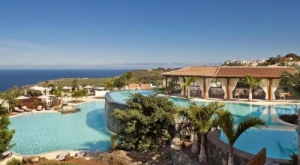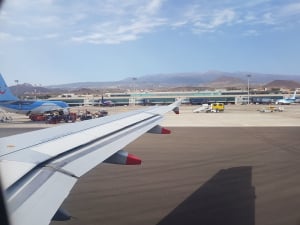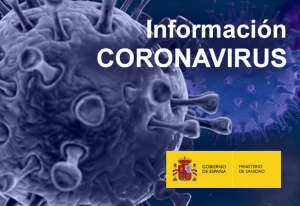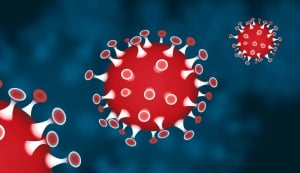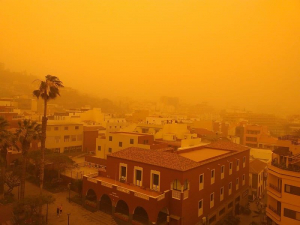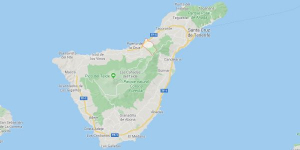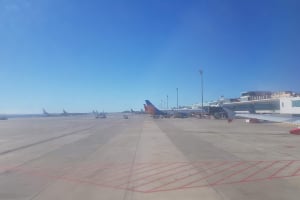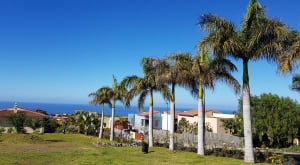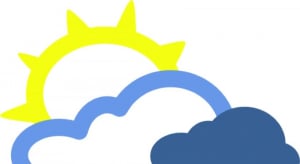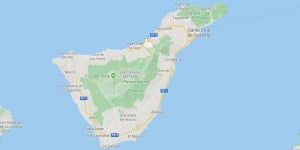Buenavista del Norte Holiday Accommodation
Low rates, no booking fees, 24/7 customer support, free cancellation.
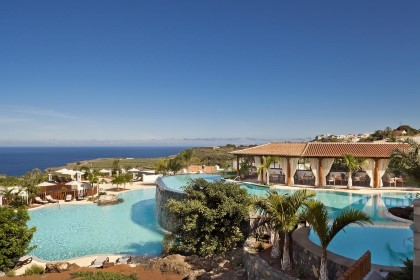
Melia Hacienda del Conde - Adults Only
5 star hotel
Luxury hotel, Free WiFi, 3 restaurants, 2 swimming pools, spa center, hot tub, air conditioned, flat-screen TV. The Level services, executive lounge, 18-hole golf course.
More Info Booking.com
Villa Luxury Punta de Teno
4 star villa
Luxury villa, private pool, accommodation with a patio, 550 meters from Punta Teno Lighthouse, garden, barbecue, free WiFi, private parking, 5 bedrooms, flat-screen TV, satellite channels, 4 bathrooms, sun terrace.
More Info Booking.com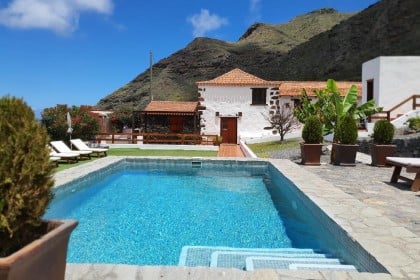
Viña Camello
3 star villa
Accommodation with outdoor swimming pool, garden, patio, pool views, barbecue, sun terrace, seating area, satellite TV, fully equipped kitchen with a microwave and a fridge, private bathroom with shower.
More Info Booking.com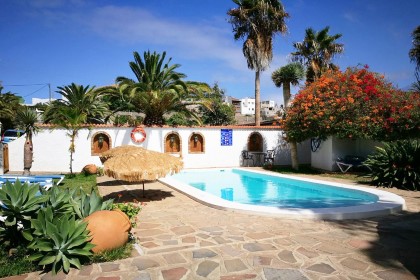
Finca el Castillo
country house
Self-catering apartments, shared outdoor swimming pool, 0.6 miles from Buenavista Golf Course, garden, furnished terrace, living room with sofa, private bathroom, BBQ facilities are also provided for your alfresco meals.
More Info Booking.com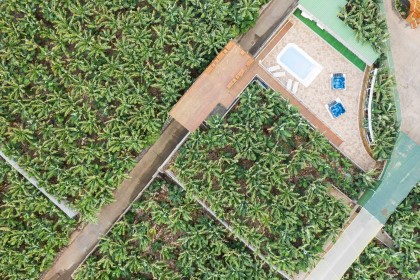
Hacienda La Dehesa (Only Adults)
4 star apartments
Self catering accommodation with free WiFi, BBQ facilities, garden, private parking, fully equipped kitchen, seating area with a sofa, TV, private bathroom, continental breakfast, hot tub and sauna.
More Info Booking.com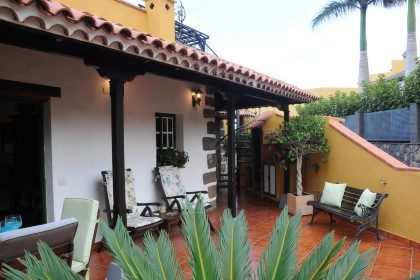
La Cuadra
3 star holiday home
Holiday accommodation with barbecue facilities, free WiFi, a 24-hour front desk, tour desk, sun terrace, garden views, patio, 2 bedrooms, flat-screen TV, satellite channels, equipped kitchen, bathroom with a shower.
More Info Booking.com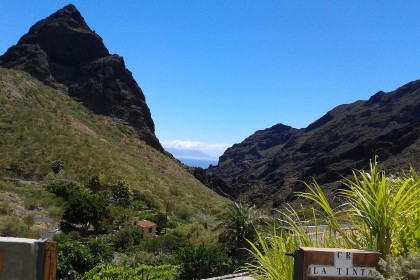
Casa Rural La Tinta
3 star holiday home
Holiday home, lounge, terrace, 24-hour front desk, private pool, garden, BBQ, free WiFi, private parking, 3 bedrooms, flat-screen TV, satellite channels, equipped kitchen, 1 bathroom with a hot tub.
More Info Booking.com
Casa Rural Las Piedras
rural country house
Fantastic views of Gomera Island and Mountains, rustic décor rooms, outdoor terraces, beautiful gardens, 1 double room, seating area with a sofa bed, TV, private bathroom, kitchenette including coffee maker.
More Info Booking.com
Alojamientos El Tejado
apartments
Rustic-style studios and apartments set around an outdoor swimming pool and sun terrace, free Wi-Fi, beamed ceilings and wooden furnishings, kitchen, living-dining, sofa, flat-screen TV.
More Info Booking.com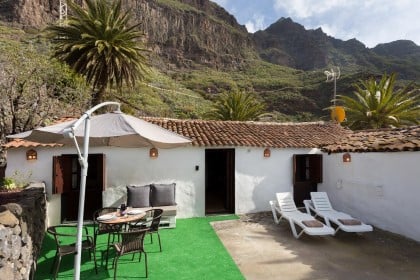
Masca with Garden
3 star casa
Featuring a garden, barbecue facilities, a terrace, free WiFi, garden views, private parking, 1 bedroom, living room, flat-screen TV, equipped kitchen, dining area, bathroom with a shower.
More Info Booking.comShowing 1 to 10 of 100's
Load MoreRead our Buenavista del Norte Review
Booking.comCovid-19 Requirements To Enter Tenerife
Updated 6th July 2023
The Spanish Government has declared the end of the COVID-19 health crisis. All restrictions related to COVID-19 and all requirements to wear face masks have been lifted. There are also no restrictions on travelling to and entering Tenerife due to COVID-19.
From 21st October 2022, all COVID-19 travel restrictions for travellers to Tenerife are lifted. Previously applied rules to travellers arriving in Tenerife no longer apply
- You are no longer required to show proof of being fully vaccinated.
- You are no longer needed to show proof of a negative COVID-19 test.
- You are no longer required to show proof of having recovered from COVID-19 in the last six months.
- You are no longer required to complete a health control form before travel.
- You are no longer required to wear masks on public transport.
Read more information on the covid situation in Tenerife on this link Updates On The COVID-19 Outbreak On Tenerife.
Useful covid-19 links.
- Canary Island tourist board website Covid statement
- Spanish Health Ministry COVID-19 info
- UK Government Foreign travel advice for Spain
More about Updates On The COVID-19 Outbreak On Tenerife.
If you plan to travel to Spain, you should check the latest entry requirements before travel.
IMPORTANT: New rules apply to enter Spain for UK citizens.
Since Brexit, the UK is considered a non-EU country.We have information specifically about entry requirements into Tenerife after Brexit in another post.
************************
************ Historic Covid Updates Below For Interest Only And Are Not Current***************
Are there any exceptions for non-EU citizens?
Yes, the Orden specifies exemptions allowing entrance into Spain for non-EU citizens (including British citizens) in the following cases:
- residents of the EU, Schengen states, Andorra, the Vatican and San Marino who are travelling to their place of residence
- long term Spanish visa holders
- health care professionals and carers who travel for work
- transport workers
- diplomats, military and members of international organisations
- students with permission or Spanish visas and medical insurance
- ighly qualified professionals in some justified cases
- people who are travelling for essential and justified family matters
- force majeure cases, necessary situations or humanitarian reasons
- residents of countries not affected by the restrictions, in some cases
If you are due to travel to Tenerife, please contact your travel operator before departure.
Changes to pre-departure testing from 4 am, Tuesday 7 December 2021. Before you travel to the UK, you must book and pay for a COVID-19 PCR test to be taken within 2 days of arrival in the UK and complete a passenger locator form to be completed in the 48 hours before you arrive. From 4 am, Tuesday 7 December, all people aged 12 years and over must take a PCR or LFD COVID-19 test before travelling to the UK from Tenerife. You must take the test during the two days before your flight departs. This applies whether you qualify as fully vaccinated or not. Children aged 11 and under, are exempt from taking the test. UK Government Foreign travel advice for Spain
Tenerife Travel Restrictions
When returning to the UK from the Canary Islands you must self-isolate on your return unless you have had two COVID jabs.
Based on current COVID-19 risks, The Foreign, Commonwealth & Development Office (FCDO) advises against all but essential travel to Spain but excluding the Canary Islands.
Read Our Updates On The COVID-19 Outbreak On Tenerife.
Covid Test To Enter Tenerife
New specific measures on the island of Tenerife will come into effect from midnight on Friday, December 18, and will last for 14 days. Limited entry and exit from the island of Tenerife is now in force.
Entering and leaving Tenerife is restricted starting from midnight on December 18 (Friday) to January 1, 2021. The restriction applies to everyone except for those can justify trips stated in article 6 of Royal Decree-Law 926/2020, of October 25 displayed below.
Foreign tourists coming to Tenerife are also exempt from the restriction of entry only if they are staying at registered tourist accommodation. On arrival, a negative covid test must be presented. It is implied that foreign tourists using private accommodation or their own properties are not permitted to enter Tenerife.
- Assistance to health centres, services and establishments.
- Compliance with labour, professional, business, institutional or legal obligations.
- Attendance at university, teaching and educational centres, including nursery schools.
- Return to the place of permanent residence.
- Assistance and care for the elderly, minors, dependents, people with disabilities or especially vulnerable people.
- Travel to financial and insurance entities, or to refuelling stations in neighbouring areas.
- Necessary or urgent actions before the public, judicial or notarial bodies.
- Renewals of permits and official documentation, as well as other administrative procedures that cannot be postponed.
- Taking official exams or tests that cannot be delayed.
- Due to force majeure or situation of need.
- Any other activity of a similar nature, duly accredited.
It is mandatory to fill in the Spanish Governments Health Control Form and have proof of a negative Covid-19 PCR, TMA or LAMP test. An antigen test is not acceptable.
All you need to know about Covid-19 testing requirements to enter Tenerife is detailed below.
Covid 19 Testing And Screening On Arrival In Tenerife
On arrival, travellers entering Tenerife from the UK will not be required to self-isolate.
The Spanish Government has announced that from 10th December travellers from high-risk countries will be able to enter Spain with a TMA (Transcription-Mediated Amplification) or a LAMP (loop-mediated isothermal amplification) test as an alternative to a PCR test. Children under six years of age no longer need to be tested.
Spanish authorities require all passengers arriving from 'risk' countries (as determined by the European Centre for Disease Prevention & Control) at Spanish airports and seaports to present a negative PCR, TMA or a LAMP test taken within no more than 72 hours before arrival. The UK is currently on the 'risk' countries list, and passengers arriving from the UK are therefore subject to this requirement.
This requirement applies to all passengers arriving in Spain by air or sea, regardless of your residency status in Spain and the length of time you intend on staying. This requirement does not currently apply to those travelling overland or those transiting Spain.
If you are travelling to Tenerife by air or sea, you must declare on the mandatory 'Health Control Form' that you have undertaken a Covid-19 test within the 72 hours before arrival. The test result must be negative for COVID-19, and you must show on request evidence certifying your results. The document you provide must be the original, be written in Spanish or English, may be submitted in paper or electronic format and must contain the following information:
- name of passenger
- test date
- name and contact details of the testing centre
- the testing method applied (i.e. PCR)
- test results
- What happens if, having declared that I have it, I do not present the PDIA / PCR document with a negative result upon my arrival in Spain? A test will be performed. Also, you will be failing to comply with a health requirement for entry to Spain, and will have made a documentary falsity in a legal document.
- What are the penalties for having declared in the Health Control Form that I have a negative certificate of a PCR test for COVID-19, and I do not present the supporting document upon my arrival in Spain? Minor offenses will lead to the imposition of penalties of up to 3,000 euros. In the case of serious violations, a fine of 3,001 to 60,000 euros will apply.
Read Our Updates On The COVID-19 Outbreak On Tenerife.
The Canary Islands Government has tried to assist UK travellers who require Covid PCR test before arrival on Tenerife by compiling a list of some Covid testing centres in the UK, this list is not exclusive; you are free to find your own Covid test centre. Also, there are new Covid test centers at Gatwick Airport and Edinburgh Airport where test results will be given in 24 hours..
You will also be subject to the following additional requirements at the point of entry:
Mandatory FCS form
It is mandatory to fill out and sign the FCS form 48 hours before you enter Tenerife. You must obtain your QR Code and show it at the airport upon arrival in Tenerife. This form is available on the following link.
FCS health control formYou can do this on the Spain Travel Health website or downloadable app. On completion, you will be issued a personal and non-transferable QR code which you must show (electronically or hardcopy) at airport health controls on arrival. Anyone who has not completed this form electronically via the Spain Travel Health website or app may submit it in paper format prior to boarding.
Anyone who presents symptoms or fails to meet one of the above requirements will be required to undergo a test on arrival and will be obliged to observe the COVID-19 protocols in place as determined by the local authorities of your destination in Spain.
On arrival at Tenerife airport you will be required to provide the following
- Provide contact information and any history of exposure to COVID-19
- Temperature check
- Undergo a visual health assessment
- Confirmation you are able to provide evidence certifying you have undertaken a PCR (swab) test within 72 hours or arrival, and have tested negative for COVID-19.
- Fines may be issued to anyone who arrives in Spanish airports and ports from ‘risk’ countries without adequate evidence of a negative PCR (swab) test.
- Passengers may also be contacted and required to undertake a PCR (swab) test at any point up to 48 hours after their arrival in Spain.
- You should not use the NHS testing service to get a test to facilitate your travel to another country. You should arrange to take a private test.
For further information on the above requirements, see the Spain Travel Health website prior to travel.
Read Our Updates On The COVID-19 Outbreak On Tenerife.
Entering Tenerife
To enter Tenerife or anywhere else in Spain, you must now fill out a form ether online on the website, or using the official app to obtain a QR code which must be shown at the arrival airport before you will be allowed to enter Spain. This is scanned on arrival at passport control before you can pass through.
The form is so the Spanish authorities are aware of your recent travel history and any Covid-19 related symptoms. It is a legal declaration. To complete the form, you need your address in Spain (hotel or apartment complex), your contact details so you can be contacted if needed, passport number, and you must also give details of any recent international travel.
The form can be completed on the website then print off the QR code, or you can download the app on your mobile phone where the QR code will be stored ready to be scanned on arrival.
Spain Travel Health Form
To download the app on to your mobile phone, enter ‘Spain Travel Health’ in to your app store and download the Spain Travel Health -STH app. Fill in the details as required.
Download Spain Travel Health form here
- You must wear a facemask everywhere on the airport premises.
- Respect the markings and footprint signs throughout the airport to ensure a distance of 1.5m.
- Keep a safe distance, wear your facemask and follow the recommended hygiene measures (cough into the crook of your elbow, wash your hands, etc.).
- Hand sanitiser dispensers are available throughout the airport.
- Only use a bottle or container at the airport’s water fountains.
Read our extensive Tenerife Cornavirus COVID-19 Outbreak Updates
For more information see Aena website
English Translation of Coronavirus Spanish Royal Decree 463/2020 State of Alarm March 14 2020 COVID-19
Below we have translated into English the entire Royal Decree 463/2020, of March 14, declaring the state of alarm for the management of the health crisis situation caused by COVID-19. Of particular interest to those in or planning to travel to Tenerife in the near future is Article 10 and the Annex at the bottom of the post, these state clearly the situation regarding tourist type facilities include bars, restaurants, cafes, tourist attractions etc. They are all closed for at least 15 days from 15th March 2020.
There is up to date information on our website on the current state of the situation regarding COVID-19 Coronavirus on Tenerife.
Royal Decree 463/2020 State of Alarm March 14 2020 COVID-19
On March 11, 2020, the World Health Organization elevated the public health emergency situation caused by COVID-19 to an international pandemic. The rapid evolution of events, at the national and international levels, requires the adoption of immediate and effective measures to face this situation. The extraordinary circumstances that arise constitute, without a doubt, an unprecedented health crisis and of enormous magnitude, both due to the very high number of citizens affected and the extraordinary risk to their rights.
Article four, section b) of Organic Law 4/1981, of June 1, on the states of alarm, exception and siege, empowers the Government to, in the exercise of the powers attributed to it by article 116.2 of the Constitution, to declare a state of alarm, in all or part of the national territory, when sanitary crises occur that suppose serious alterations of normality.
Within this framework, the measures provided for in this regulation are part of the Government's decisive action to protect the health and safety of citizens, contain the progression of the disease and strengthen the public health system. The extraordinary temporary measures that have already been taken by all levels of government must now be stepped up without delay to prevent and contain the virus and mitigate the health, social and economic impact.
In order to face this serious and exceptional situation, it is essential to proceed to the declaration of the state of alarm.
The measures contained in this royal decree are essential to deal with the situation, are proportionate to the extreme seriousness of it and do not imply the suspension of any fundamental right, as provided for in article 55 of the Constitution.
By virtue of this, at the proposal of the First Vice President of the Government and Minister of the Presidency, Relations with the Courts and Democratic Memory, the Minister of Health, the Minister of Defense, and the Ministers of the Interior, and of Transport, Mobility and Urban Agenda, and after deliberation by the Council of Ministers at its meeting on March 14, 2020.
Article 1. Declaration of the alarm status.
Under the provisions of article fourth, sections b) and d), of Organic Law 4/1981, of June 1, on the states of alarm, exception and siege, the state of alarm is declared in order to face the health emergency situation caused by the coronavirus COVID-19.
Article 2. Territorial scope.
The declaration of the state of alarm affects the entire national territory.
Article 3. Duration.
The duration of the state of alarm that is declared by this royal decree is fifteen calendar days.
Article 4. Competent authority.
1. For the purposes of the state of alarm, the competent authority will be the Government.
2. For the exercise of the functions referred to in this royal decree, under the highest direction of the Prime Minister, will be delegated competent authorities, in their respective areas of responsibility:
b) The Minister of the Interior.
c) The Minister of Transport, Mobility and Urban Agenda.
d) The Minister of Health. Likewise, in areas of responsibility that do not fall within the competence of any of the Ministers indicated in paragraphs a), b) or c), the Minister of Health shall be the delegated competent authority.
3. The Ministers designated as the competent authorities delegated in this royal decree are empowered to issue the orders, resolutions, provisions and interpretive instructions that, in the specific sphere of their action, are necessary to guarantee the provision of all services, ordinary or extraordinary. , in order to protect people, property and places, by adopting any of the measures provided for in article eleven of Organic Law 4/1981, of June 1. The acts, provisions and measures referred to in the preceding paragraph may be adopted ex officio or at the motivated request of the competent regional and local authorities, in accordance with the applicable legislation in each case and must pay attention to vulnerable people. For this, the administrative procedure will not be necessary.
4. During the validity of the state of alarm, the Situation Committee provided for in the first additional provision of Law 36/2015, of September 28, on National Security, is activated as an organ to support the Government in its capacity as competent authority. Article 5. Collaboration with the delegated competent authorities.
1. The members of the State Security Forces and Bodies, the Police Bodies of the autonomous communities and local corporations will be under the direct orders of the Minister of the Interior, for the purposes of this royal decree, as necessary to the protection of people, goods and places, being able to impose extraordinary services for their duration or their nature.
2. The agents of the authority will be able to carry out the checks on people, goods, vehicles, premises and establishments that are necessary to check and, where appropriate, prevent the services and activities suspended in this royal decree from taking place, except those expressly excepted. To do this, they may issue the necessary orders and prohibitions and suspend the activities or services that are being carried out. To this end, citizens have the duty to collaborate and not hinder the work of the agents of authority in the exercise of their functions.
3. In those autonomous communities that have their own police forces, the Monitoring and Coordination Commissions established in the respective Security Boards will establish the necessary mechanisms to ensure what is stated in the two previous sections.
4. The intervention services and assistance in civil protection emergencies defined in article 17 of Law 17/2015, of July 9, of the National Civil Protection System, will act under the functional dependency of the Minister of the Interior.
5. The Minister of the Interior may issue the orders, resolutions, provisions and instructions that he considers necessary to all the subjects included in the scope of application of Law 5/2014, of April 4, on Private Security.
6. For the effective compliance of the measures included in this royal decree, the competent delegated authorities may require the action of the Armed Forces, in accordance with the provisions of article 15.3 of Organic Law 5/2005, of November 17 , of the National Defense.
Article 6. Ordinary management of services.
Each Administration will retain the powers granted by the current legislation in the ordinary management of its services to adopt the measures it deems necessary within the framework of the direct orders of the competent authority for the purposes of the state of alarm and without prejudice to the provisions of articles 4 and 5. Article 7. Limitation of the freedom of movement of people.
1. During the validity of the state of alarm, people may only circulate along the roads for public use to carry out the following activities:
a) Acquisition of food, pharmaceuticals and basic necessities.
b) Assistance to health centers, services and establishments.
c) Travel to the workplace to carry out their labor, professional or business provision.
d) Return to the place of habitual residence.
e) Assistance and care for the elderly, minors, dependents, people with disabilities or especially vulnerable people.
f) Displacement to financial and insurance entities.
g) Due to force majeure or need.
h) Any other activity of a similar nature that must be done individually, unless accompanied by people with disabilities or for other justified cause.
2. Likewise, private vehicles will be allowed to circulate along public use roads to carry out the activities referred to in the previous section or to refuel at gas stations or service stations.
3. In any case, in any displacement the recommendations and obligations dictated by the health authorities must be respected.
4. The Minister of the Interior may decide to close the circulation of roads or sections of them for reasons of public health, traffic safety or fluidity or the restriction in them of the access of certain vehicles for the same reasons. When the measures referred to in the preceding paragraphs are adopted ex officio, the regional administrations that exercise powers to execute the State legislation on traffic, vehicle circulation and road safety will be previously informed. The state, regional and local authorities competent in matters of traffic, vehicle circulation and road safety will guarantee the dissemination among the population of measures that may affect road traffic.
Article 8. Temporary requirements and compulsory personal benefits.
1. In accordance with the provisions of article eleven b) of Organic Law 4/1981, of June 1, the delegated competent authorities may agree, ex officio or at the request of the autonomous communities or local entities, that they be practiced Temporary requisitions of all kinds of goods necessary for the fulfillment of the purposes set forth in this royal decree, in particular for the provision of security services or critical and essential operators. When the requisition is agreed ex officio, the corresponding regional or local Administration will be previously informed.
2. In the same terms, the performance of mandatory personal benefits essential for the achievement of the purposes of this royal decree may be imposed.
Article 9. Containment measures in the educational and training field.
1. Face-to-face educational activity is suspended in all centers and stages, cycles, degrees, courses and levels of education contemplated in article 3 of Organic Law 2/2006, of May 3, on Education, including university education, as well as any other educational or training activities taught in other public or private centers.
2. During the suspension period, educational activities will be maintained through distance and online modalities, whenever possible.
Article 10. Containment measures in the field of commercial activity, cultural facilities, recreational establishments and activities, hotel and restaurant activities, and other additional activities.
1. The opening to the public of retail establishments and establishments is suspended, with the exception of retail commercial establishments for food, beverages, products and basic necessities, pharmaceutical establishments, medical, optical and orthopedic products, hygienic products, hairdressing salons, newspapers. and stationery, automotive fuel, tobacconists, technological and telecommunications equipment, pet food, internet commerce, telephone or correspondence, dry cleaners and laundries. Any other activity or establishment that in the opinion of the competent authority may pose a risk of contagion is suspended.
2. The permanence in commercial establishments whose opening is allowed must be strictly necessary so that consumers can purchase food and basic necessities, the possibility of consuming products in the establishments themselves being suspended. In any case, crowds will be avoided and consumers and employees will be controlled to maintain the safety distance of at least one meter in order to avoid possible contagion.
3. The opening to the public of the museums, archives, libraries, monuments, as well as of the premises and establishments in which public shows take place, the sports and leisure activities indicated in the annex to this royal decree are suspended.
4. Hotel and restaurant activities are suspended, and home delivery services can be exclusively provided.
5. Verbenas, parades and popular festivals are also suspended.
Article 11. Containment measures in relation to places of worship and with civil and religious ceremonies.
Attendance at places of worship and civil and religious ceremonies, including funerals, are conditional on the adoption of organizational measures consisting of avoiding crowds of people, depending on the dimensions and characteristics of the places, in such a way as to guarantee attendees the possibility of respecting the distance between them of at least one meter.
Article 12. Measures aimed at strengthening the National Health System throughout the national territory.
1. All the civil sanitary authorities of the public administrations of the national territory, as well as the other officials and workers at their service, will be under the direct orders of the Minister of Health as necessary for the protection of people, property and places. , being able to impose extraordinary services for their duration or their nature.
2. Notwithstanding the foregoing, the regional and local public administrations will maintain the management, within their sphere of competence, of the corresponding health services, ensuring their proper functioning at all times. The Minister of Health reserves the exercise of all the powers that are necessary to guarantee cohesion and equity in the provision of said service.
3. In particular, the full disposition of the civil authorities responsible for the field of public health, and of the employees who provide services in it, will be ensured.
4. These measures will also guarantee the possibility of determining the best distribution in the territory of all technical and personal resources, in accordance with the needs that become apparent in the management of this health crisis.
5. The competent delegated authorities shall exercise their powers to ensure that personnel and military health centers and establishments contribute to strengthening the National Health System throughout the national territory.
6. Likewise, the Minister of Health may exercise those powers that are necessary for these purposes with respect to privately owned health centers, services and establishments.
Article 13. Measures to ensure the supply of goods and services necessary for the protection of public health.
The Minister of Health may:
a) Issue the necessary orders to ensure the supply of the market and the operation of the services of the production centers affected by the shortage of products necessary for the protection of public health.
b) Intervene and temporarily occupy industries, factories, workshops, farms or premises of any nature, including privately owned health centers, services and establishments, as well as those that carry out their activity in the pharmaceutical sector.
c) Practice temporary searches of all kinds of goods and impose mandatory personal benefits in those cases where it is necessary for the adequate protection of public health, in the context of this health crisis.
Article 14. Transport measures.
1. In relation to all means of transport, whatever the competent Administration may be, the following shall apply:
a) The Minister of Transport, Mobility and Urban Agenda is empowered to dictate the acts and provisions that, in the specific sphere of his action, are necessary to establish conditions for the mobility services, ordinary or extraordinary, in order to protect people, goods and places.
b) The acts, provisions and measures referred to in paragraph a) above may be adopted ex officio or at the motivated request of the competent regional and local authorities, in accordance with the applicable legislation in each case. This will not require the processing of any administrative procedure.
2. Likewise, the following measures applicable to internal transport are adopted:
a) In public road, rail, air and sea passenger transport services that are not subject to a public contract or public service obligations (OSP), transport operators will reduce the total supply of operations by at least one fifty %. By resolution of the Minister of Transport, Mobility and Urban Agenda, this percentage may be modified and specific conditions may be established.
b) State-owned public passenger, road, rail, air and sea transportation services that are subject to public contract or OSP will reduce their total offer of operations by at least the following percentages: i. Medium distance rail services: 50%. ii. Medium-distance railway services-AVANT: 50%. iii. Regular road passenger transport services: 50%. iv. Air transport services subject to OSP: 50%. v. Maritime transport services subject to a navigation contract: 50%. Commuter rail services will maintain their range of services. By resolution of the Minister of Transport, Mobility and Urban Agenda, the reduction percentages of the services referred to above may be modified and specific conditions may be established in this regard. This resolution will take into account the need to ensure that citizens can access their jobs and basic services if necessary.
c) Public transport services for road, rail and maritime passengers of regional or local competence that are subject to a public contract or OSP, or are publicly owned, will maintain their transport offer. The Minister of Transport, Mobility and Urban Agenda and the regional and local authorities with powers in the field of transport may establish a percentage reduction in services in case the health situation so advises, as well as other specific conditions for the provision of the same. In adopting these measures, the need to ensure that citizens can access their jobs and basic services if necessary is taken into account.
d) Without prejudice to the provisions of paragraphs a), b) and c), specific criteria shall be established for transport between the Peninsula and non-peninsular territories, as well as for transport between islands.
e) In relation to all means of transport, operators of passenger transport services are obliged to carry out daily cleaning of transport vehicles, in accordance with the recommendations established by the Ministry of Health.
f) Online ticket sales systems must include, during the ticket sale process, a sufficiently visible message advising against traveling except for reasons that cannot be postponed. By order of the Minister of Transport, Mobility and Urban Agenda, the characteristics and content of this announcement may be established.
g) In those services in which the ticket grants a seat or cabin, the transport operators will take the necessary measures to ensure the maximum possible separation between passengers.
3. Transport operators will carry out the necessary adjustments to comply with the percentages established in this article as homogeneously as possible among the different services they provide and may ask the Ministry of Transport, Mobility and the Urban Agenda for any questions that require interpretation. or clarification. If for technical or operational reasons the direct application of the percentages established from the first day is not feasible, the quickest possible adjustment of the services should be carried out, which may not last more than five days.
4. By resolution of the Minister of Transport, Mobility and Urban Agenda, the necessary conditions will be established to facilitate the transport of goods throughout the national territory, in order to guarantee supply.
5. The delegated competent authorities may adopt all additional measures necessary to limit the circulation of collective means of transport that are necessary and proportionate to preserve public health.
Article 15. Measures to guarantee food supply.
1. The delegated competent authorities shall take the necessary measures to ensure:
a) The food supply in the places of consumption and the operation of the services of the production centers, allowing the distribution of food from the origin to the commercial establishments for sale to the consumer, including warehouses, logistics centers and destination markets. In particular, when it is necessary for security reasons, the accompaniment of the vehicles that carry the mentioned goods may be agreed.
b) When necessary, the establishment of sanitary corridors to allow the entry and exit of people, raw materials and processed products destined for or coming from establishments where food is produced, including farms, markets, animal feed factories and slaughterhouses.
2. Likewise, the competent authorities may agree on the intervention of companies or services, as well as the mobilization of the State Security Forces and Bodies and the Armed Forces in order to ensure the proper functioning of the provisions of this article.
Article 16. Customs transit.
The delegated competent authorities shall adopt the necessary measures to guarantee customs transit at the points of entry or border inspection points located in ports or airports. In this regard, priority products will be addressed. Article 17. Guarantee of supply of electrical energy, products derived from petroleum and natural gas. The delegated competent authorities may adopt the necessary measures to guarantee the supply of electrical energy, petroleum products, as well as natural gas, in accordance with the provisions of article 7 of Law 24/2013, of December 26, of the Electricity Sector, and in articles 49 and 101 of Law 34/1998, of October 7, on the hydrocarbon sector. Article 18. Critical operators of essential services.
1. The critical operators of essential services provided for in Law 8/2011, of April 28, which establishes measures for the protection of critical infrastructures, shall adopt the necessary measures to ensure the provision of essential services that are their own.
2. Said requirement will also be adopted by those companies and suppliers that, not having the consideration of critics, are essential to ensure the supply of the population and the essential services themselves.
Article 19. Means of communication of public and private ownership.
The public and private-owned social media are obliged to insert messages, announcements and communications that the competent delegated authorities, as well as the regional and local administrations, deem necessary to issue.
Article 20. Penalty regime.
Failure to comply or resistance to the orders of the competent authorities in the state of alarm will be punished in accordance with the laws, in the terms established in article ten of Organic Law 4/1981, of June 1.
First additional provision.
Foreign personnel accredited as a member of diplomatic missions. Foreign personnel accredited as a member of diplomatic missions, consular offices and international organizations located in Spain, both for travel within the national territory, to their country of origin or to third States, in the that it is equally accredited, provided that these are displacements linked to the performance of official functions.
Second additional provision.
Suspension of procedural deadlines.
1. Terms are suspended and the periods provided for in procedural laws are suspended and interrupted for all jurisdictional orders. The computation of the terms will be resumed at the moment the present royal decree or, where appropriate, its extensions, ceases to be in force.
2. In the criminal jurisdictional order, suspension and interruption shall not apply to habeas corpus procedures, to the actions entrusted to the guard services, to actions with detainees, to protection orders, to urgent actions in matters of prison surveillance and any precautionary measures regarding violence against women or minors. Likewise, in the investigation phase, the competent judge or court may agree to the practice of those actions that, due to their urgent nature, cannot be postponed.
3. In relation to the rest of the jurisdictional orders, the interruption referred to in the first section shall not apply to the following cases:
a) The procedure for the protection of the fundamental rights of the person provided for in articles 114 and following of Law 29/1998, of July 13, regulating the Contentious-Administrative Jurisdiction, or the processing of authorizations or ratifications judicial provisions in article 8.6 of the aforementioned law.
b) The procedures for collective conflict and for the protection of fundamental rights and public liberties regulated in Law 36/2011, of October 10, regulating social jurisdiction.
c) The judicial authorization for non-voluntary internment due to a mental disorder provided for in article 763 of Law 1/2000, of January 7, on Civil Procedure.
d) The adoption of measures or provisions for the protection of minors provided for in article 158 of the Civil Code.
4. Notwithstanding the provisions of the preceding paragraphs, the judge or court may agree to the practice of any judicial actions that are necessary to avoid irreparable damage to the legitimate rights and interests of the parties in the process. Third additional provision. Suspension of administrative deadlines.
1. Terms are suspended and deadlines are interrupted for processing procedures of public sector entities. The computation of the terms will be resumed at the moment the present royal decree or, where appropriate, its extensions, ceases to be in force.
2. The suspension of terms and the interruption of deadlines will apply to the entire public sector defined in Law 39/2015, of October 1, on the Common Administrative Procedure of Public Administrations.
3. Notwithstanding the foregoing, the competent body may agree, by means of a reasoned resolution, the management and instruction measures strictly necessary to avoid serious damage to the rights and interests of the interested party in the procedure and provided that the latter expresses its agreement, or when the interested party expresses its agreement that the term is not suspended.
4. This provision shall not affect the procedures and resolutions referred to in the first section, when they are referred to situations closely related to the facts justifying the state of alarm.
Fourth additional provision.
Suspension of prescription periods and expiration. The statute of limitations and expiration of any actions and rights will be suspended during the term of the state of alarm and, where appropriate, of the extensions that are adopted.
Fifth additional provision. Character of agent of the authority of the members of the Armed Forces. In accordance with the third additional provision of Law 39/2007, of November 19, on the Military Career, in relation to articles 15.3 and 16 e) of Organic Law 5/2005, of November 17, on Defense National, the members of the Armed Forces in the exercise of the functions provided for in this royal decree shall be agents of the authority.
First final provision. Ratification of the measures adopted by the competent authorities of the Public Administrations.
1. All the provisions and measures previously adopted by the competent authorities of the autonomous communities and local entities on the occasion of the COVID-19 coronavirus are ratified, which will continue in force and will produce the effects envisaged in them, provided they are compatible with this real decree.
2. The ratification contemplated in this provision is understood without prejudice to the judicial ratification provided for in article 8.6.2.º of Law 29/1998, of July 13. Second final provision.
Qualification. During the validity of the state of alarm declared by this royal decree, the Government may issue successive decrees that modify or extend the measures established therein, of which it shall report to the Congress of Deputies in accordance with the provisions of article eight. two of the Organic Law 4/1981, of June 1.
Third final provision. Entry into force. This royal decree shall enter into force at the time of its publication in the "Official State Gazette". Given in Madrid, on March 14, 2020.
FELIPE R.
The First Vice President of the Government and Minister of the Presidency,
Relations with the Courts and Democratic Memory,
CARMEN CALVO POYATO
ANNEX
List of facilities and activities whose opening to the public is suspended in accordance with the provisions of article 10.3
Records.
Libraries.
Monuments.
Public shows.
Leisure and fun:
Coffee-show.
Circuses.
Exhibition venues.
Party rooms.
Restaurant-show.
Other premises or facilities similar to those mentioned.
Cultural and artistic:
Auditoriums.
Movie theaters.
Squares, venues and bullfighting facilities.
Other venues and facilities:
Congress Pavilions.
Concert halls.
Conference rooms.
Exposition halls.
Multipurpose rooms.
Theaters
Sports:
Premises or closed rooms.
Soccer, rugby, baseball and similar fields.
Basketball, handball, volleyball and similar fields.
Clay pigeon shooting ranges, and assimilable.
Shooting galleries.
Tennis courts and assimilable.
Skating rinks, ice hockey, skates and the like.
Swimming pools.
Boxing, wrestling, judo and similar venues.
Permanent circuits of motorcycles, automobiles and the like.
Velodromes.
Racetracks, dog tracks and the like.
Pediments, ratchets, squash courts and the like.
Sports centers.
Bowling alleys and assimilable.
Billiards and assimilable rooms.
Gyms.
Running tracks.
Stadiums.
Other premises, facilities or activities similar to those mentioned.
Open spaces and public roads:
Pedestrian race routes.
Cycling, motorcyclist, automobile and similar test routes.
Motocross, trial and similar routes.
Nautical tests and exhibitions.
Aeronautical tests and exhibitions.
Other premises, facilities or activities similar to those mentioned.
Recreational activities:
Of dance:
Discotheques and dance halls.
Youth rooms.
Sports-recreational:
Premises or venues, without spectators, intended for sports-recreational practice for public use, in any of its modalities.
Games and bets:
Casinos
Establishments of collective games of money and chance.
Game rooms.
Recreational rooms.
Raffles and tombolas.
Other premises and facilities that can be assimilated to those of recreational activity for Games and betting in accordance with the provisions of the sectorial regulations on gaming.
Specific betting locations.
Cultural and leisure:
Amusement parks, fairs and the like.
Waterparks.
Fair booths.
Zoological parks.
Children's recreational parks.
Open spaces and public roads:
Verbenas, parades and popular parties or folkloric manifestations.
Leisure and fun:
Special bars:
Cocktail bars without live music performances.
Cocktail bars with live musical performances.
Hospitality and restoration:
Taverns and cellars.
Cafeterias, bars, cafe-bars and the like.
Chocolatiers, ice cream parlors, tea rooms, croissants and assimilates.
Restaurants, self-service restaurants and the like.
Bars-restaurant.
Hotel bars and restaurants, except to serve their guests.
Banquet halls.
Terraces.
Tenerife Cornavirus COVID-19 Outbreak Updates
Updated 6th July 2023
Tenerife Covid Restrictions Summary
The Spanish Government has officially declared the end of the COVID-19 health crisis. All restrictions related to COVID-19 and all requirements to wear face masks have been lifted. There are also no restrictions on travelling to and entering Tenerife due to COVID-19.
The use of face coverings is no longer mandatory for anyone on public transport. The restrictions were removed for travelling on buses and taxis on 8th February 2023.
Read all the latest information about the rules to enter Tenerife on the Tenerife Covid entry requirements page for the latest requirements for entering Tenerife.
- Masks must be worn by adults and children over the age of 6 in health centres and pharmacies. Not mandatory if you are disabled or have a respiratory condition.
- No restrictions on entering or leaving Tenerife.
- No night time curfew.
- Everyone arriving in Tenerife must comply with the entry rules.
Everyone arriving in Tenerife must comply with the entry rules.
************ Historic Covid Updates Below For Interest Only And Are Not Current***************
Update 31st October 2020
UK Government bans foreign travel between Thursday 5 November and Wednesday 2 December.
Update 26th September 2020
Tenerife has been placed in to special measures as the cases in one of the islands municipalities, Santa Cruz de Tenerife, has exceeded 100/100 000. This means bars must now close at 24:00 and no one to be admitted after 23:00. Also gatherings of more than 10 people is prohibited. These measures will be in effect until 10th October 2020.
The FCDO says: We know how much tourism matters to Spain and the Canary Islands, as well as to the many UK nationals who visit every year, especially during the winter months. But Coronavirus is still a significant challenge for all of us, so if you do travel, please ensure you comply with local regulations, such as social distancing and wearing masks.
New Covid-19 Requirements To Enter Tenerife
Update 14th August 2020
Update 17:08
Announced this afternoon: all nightclubs are now completely closed i.e. discos. All bars and restaurants must close by 1am, no one is to be admitted after midnight. These measures are being taken as the driver of Covid infection is now by young people under 30 years of age not adhering to the rules to prevent infection, therefore places where they meet are being targeted.
Smoking and vaping is also banned in all public places.
From today face masks must be worn at all times in public places, this includes in the street. Masks must be worn properly at all times, indoors and outdoors in all public places, bars, cafes, restaurants, hotels. Masks can only be removed for the purpose of eating and drinking, or on the beach sunbathing and swimming (only sunbathing and swimming, not strolling along the beach).
Groups of 10 or more people is banned and all establishments must display marked separation distances of 1.5 meters.
Parties of any kind are banned.
Read More Detailed Info About Requirements To Enter Tenerife
Also see UK Government Foreign and Commonwealth Office advice for Spain.
Update 28th July 2020
Jet2 are advising not to travel to the airport today if you are flying to the Canary Islands or the Balearic Islands as all flights to these destinations have been cancelled due to the latest Government advice
TUI UK have taken the decision to cancel all holidays to the Balearic Islands and Canary Islands up to and including Friday 31 July 2020, alongside cancellations already in place to mainland Spain, up to and including Sunday 9th August 2020.
Update 27th July 2020
Update 18:38
UK changes travel advice for the Canary Islands. At 6pm today 27th July, the FCO advised against all non-essential travel to Spain, including the Balearic and Canary Islands, based on the current assessment of COVID-19 risks in the country. This change includes all the Canary Islands, including Tenerife.
It was hoped the Bristish Government would make an exception for the Canary Islands and the Balearic Islands as the cases of Covid-19 were low in these places. The British Government have done the exact opposite and now included these islands in the blanket advice not to visit Spain.
Update 09:00
Spanish and British governments will hold a meeting today, The President of the Canary Islands, Ángel Víctor Torres is hoping an agreement can be reached to avoid UK visitors having to quarantine for 14 days on their return to the UK.
Update 26th July 2020
The President of the Canary Islands, Ángel Víctor Torres, has apparently asked the Ministers of Foreign Affairs and Tourism, Arancha González Laya and Reyes Maroto, respectively, to create safe and direct air corridors between the Canary Islands and the United Kingdom.
The Minister of Tourism, Industry and Commerce of the Government of the Canary Islands, Yaiza Castilla, also had a first conversation with the ambassador of the United Kingdom in Spain, Hugh Elliot, to request more details about this decision and convey the need to maintain a direct and safe round trip route.
Due to travel advice change against all but essential travel to mainland Spain, TUI UK have taken the decision to cancel all flights to mainland Spain up to and including Sunday 9 August 2020, flights to the Balearic Islands and Canary Islands from Monday 27 July will continue as planned.
Update 25th July 2020
The British Government have this evening announced that all people returning from Spain, including the the Canary Islands, will from midnight tonight have to go into 14 day quarantine on return to the UK.
The Foreign and Commonwealth Office (FCO) have subsequently advised against all but essential travel to mainland Spain, the Canary Islands and the Balearic Islands are exempt from the FCO advice against all non-essential international travel.
Update 3rd July 2020
From 4 July, Spain is exempt from the FCO advice against all non-essential international travel. This is based on the current assessment of COVID-19 risks.
Update 21st June 2020
The State of Emergency (“Estado de Alarma”) declared on March 14 in response to the coronavirus outbreak, ends on June 21 and Spain enters the ‘new normal’ phase of its de-escalation strategy. Restrictions on movement throughout the country will be lifted and travel between regions permitted. Social distancing measures and other safety precautions should continue to be observed at all times.
This means that British nationals will no longer need to present a residency certificate to enter Spain. The Spanish Government has confirmed that travellers arriving from the United Kingdom from June 21 will not be required to self-isolate on arrival in Spain, however, they will be subject to the following three requirements:
- Provide contact information and any history of exposure to COVID-19
- Temperature check
- Undergo a visual health assessment
Anyone who presents symptoms or fails one of the above requirements will be seen by a health professional.
Key ‘new normal’ measures include: social distancing of 1.5-metres; obligatory use of face masks in public spaces (see ‘Use of facemasks’); track and trace – all shops, businesses and transport companies are obliged to keep passengers’ contact information (where provided) for up to 4 weeks for tracking and tracing purposes.
Use of face masks; The use of face masks on public transport is compulsory. The use of face masks is obligatory to anyone over the age of 6 years old in all public spaces in Spain, where it is not possible to maintain social distancing of 1.5 metres. Face masks must cover the nose and mouth. Sanctions may be imposed if you do not comply.
Update 16th June 2020
The State of Emergency (“Estado de Alarma”) declared on 14 March, will end on June 21. From this date, Spain will re-open its borders to European Union and Schengen-area countries (with the exception of Portugal where the restrictions will continue to apply up until 1 July), and travellers from the UK. This means that British nationals will no longer need to present a residency certificate to enter Spain. The Spanish Government has said that it is possible that UK travellers will still need to quarantine on arrival in Spain, but that decision has not yet been taken.
Restrictions on travellers from outside the European Union and the Schengen free-travel area will be lifted from July 1 providing the countries they depart from have agreements with Spain
Update 28th May 2020
You must be Spanish or hold legal residency and be in possession of your 'green card' to permitted entry in to Spain.
Shops, restaurants and bars are allowed to open.
The use of face masks on public transport is compulsory. It is also compulsory for everyone over the age of 6 years to wear a face mask if social distancing of 2 meters cannot be maintained.
From 15th May all arrivals into Spain must self-isolate in their residence or hotel for 14 days, the only legal reason to be out is to collect essential supplies from the nearest shop or pharmacy, it is also mandatory to wear a mask at all times in public places when is this 14 day period.
Hotels and short stay accommodation is allowed to open with restrictions, e.g. communal areas are not to be opened.
Update 22rd March 2020, 20:01
Spain has decided to close entry to the country from midnight tonight to all except Spanish nationals and legal foreign residents.
Update 20th March, 23:01
Spain has now ordered that all hotels and similar accommodation, tourist accommodation and other short-stay accommodation, camping sites, caravan parks and other similar establishments, located in any part of the national territory must be closed to the public.
Update 19th March 2020, 21:31
The Canary Islands Ministry of Health (La Consejería de Sanidad) now reports 220 reported cases of COVID-19 coronavirus in the Canary Islands, nine people have been discharged. Of these, 82 cases are hospitalized, 23 of them are in a serious condition.
Tenerife has 143 accumulated cases, and 5 people have been discharged.In Gran Canaria there are 55 active cases and one person has died, Lanzarote has three cases, La Palma five cases, Fuerteventura now has active cases, and La Gomera has one active case with two cases registered having been discharged.
Update 18th March 2020, 14:07
A correction: Spain has not yet ordered formal hotel/campsite closures, though this is widely expected soon. We will update you when we know more. FCO advice remains that all nationals who wish to leave Spain, should make plans to do so as soon as possible.
The Foreign and Commonwealth Office has just announced that all hotels in Spain will be closed on Tuesday 24th March 2020. If you need to get back to the UK you have been warned that all flights are likely about to be cancelled soon, the next step is closure of Spanish airspace.
Update 17th March, 19:21
The Canary Islands Ministry of Health (La Consejería de Sanidad) now reports 148 active cases of COVID-19 coronavirus in the Canary Islands as of today, eight people have been discharged. Of these, fifty cases are hospitalized, thirteen of them are in a serious condition.
The two deaths have occurred in elderly people, one of them in Gran and the other in Tenerife.
Update 16th March, 18:50 Spain will be closing its boarders tonight at 24:00 to all except Spanish Citizens and legal foreign residents. Update 15th March 2020, 15:53 The Canary Islands Ministry of Health (La Consejería de Sanidad) now reports 101 active cases of COVID-19 coronavirus in the Canary Islands as of 12:00 today, seven people have been discharged. Of these, 33 cases are hospitalized, nine of them are in a serious condition. Tenerife has 70 active and 5 people have been discharged. This means there have been 75 accumulated cases in Tenerife. In Gran Canaria there are 19 active cases and one person has died, Lanzarote has three cases, La Palma five cases, Fuerteventura now has three active cases, and La Gomera has one active case with two cases registered having been discharged. This information is sourced and translated from the Canary Islands Ministry of Health La Consejería de Sanidad Update 15th March 2020, 11:03 Read the full translation of the Royal Decree 463/2020 State of Alarm March 14 2020 COVID-19 Update: 14th March 2020, 19:49 Spanish PM Sánchez has announced a national State of Alarm. Tenerife therefore is due to go into lockdown from Monday morning at 8am. This will mean that there will be no bars, restaurants or cafes open anywhere. The only reason to out anywhere is to get essential supplies, go to the pharmacy or the bank. All public events are cancelled, all museums, visitor centers, tourist attractions are all closed until further notice. The upshot is if you are coming to Tenerife do not expect things to be normal here. Update: 14th March 2020, 14:28 Spanish PM Sánchez has just announced a national State of Alarm restricting movement across the whole of Spain including the Canary Islands Update: 14th March 2020, 12:37 The Canary Islands Ministry of Health (La Consejería de Sanidad) now reports 82 active cases of COVID-19 coronavirus in the Canary Islands, seven people have been discharged and one has died. Of these, 18 cases are hospitalized, three of them are in a serious condition. Tenerife has 58 active cases and 5 people have been discharged, two new cases have occurred in the last few hours. This means there have been 63 accumulated cases in Tenerife. In Gran Canaria there are 16 active cases and one death, Lanzarote has three active cases, La Palma three cases, Fuerteventura one and La Gomera has one active case and two have been discharged. Update: 14th March 2020, 10:26 Jet2 have cancelled all flights to the Canary Islands this morning. Read more info on Jet2 flight cancellations. Update: 13th March 2020, 21:26 Transportes Interurbanos de Tenerife (Titsa) is temporarily suspending the payment in cash on all buses on Tenerife from 00:00 hours on Tuesday March 17, payment will only be accepted with the Ten+ card and mobile. This measure is being adopted following the instructions of the health authorities to prevent the spread of COVID-19. Another of the measures adopted today has been the closure of island visitor centers and the various museum facilities of the Autonomous Organization of Museums and Centers of the Tenerife Council (Organismo Autónomo de Museos y Centros del Cabildo de Tenerife (OAMC)), also the entire network of walking trails on the island are closed as are all activites in the Teide National Park and the Teleférico Teide cable car. Update: 13th March 2020, 16:59 The Canary Islands Ministry of Health (La Consejería de Sanidad ) now reports 63 active cases of COVID-19 coronavirus in the Canary Islands as of today, seven people have been discharged. Of these, 18 cases are hospitalized, three of them are in a serious condition. Tenerife has 45 positive cases and 5 people have been discharged, two new cases have occurred in the last few hours. This means there have been 50 accumulated cases in Tenerife. In Gran Canaria there are 13 active cases, Lanzarote has two cases, La Palma two cases, Fuerteventura one and the two cases registered in La Gomera have been discharged. Update: 12th March 2020, 18:11 The Canary Islands Ministry of Health (La Consejería de Sanidad ) now reports 46 active cases of COVID-19 coronavirus in the Canary Islands and five people have been discharged. Of these, 15 cases are hospitalized, two of them are in intensive care. Tenerife has 31 confirmed active cases, 3 people have been discharged, 34 cases in total. In Gran Canaria 12 active cases are confirmed, 1 case in Fuerteventura, 2 in La Palma and two cases have been discharged in La Gomera. Measures Being Taken To Fight The Coronavirus Outbreak Hospital visits to patients in all hospitals of the Canary Health Service are prohibited, except in the case of minors, patients with disabilities or the elderly requiring a companion, as well as those cases in which exceptionally and justifiably, a companion is authorized by the center's management. All events, indoors and outdoors, public and private, involving 1000 or more people are postponed for at least the next 15 days. All carnivals are also postponed. Events at venues with a capacity of less than 1000 people can only go ahead if only one third of the authorised capacity is occupied in order to guarantee an adequate separation space between people. The closure of all the clubs and leisure centers for the elderly in the Canary Islands has been ordered. The Ministry of Health has a toll-free telephone line (900 112 061), from which a Nursing team, under the coordination of the Canary Islands Emergency Service (SUC), will respond to requests for information from citizens about prevention measures, the possibility of contagion and false concepts related to the virus. In addition, it is important that people who believe they may have symptoms related to the coronavirus (cough, sore throat, fever and feeling of shortness of breath) and have returned in the last 14 days from any of the risk areas, or have been close to someone who has come from these areas, contact 1-1-2, avoiding going directly to the Primary Care centers or to the Hospital Emergency Department. Update: 11th March 2020, 17:37 The Canary Islands Ministry of Health (La Consejería de Sanidad ) now reports 28 active cases of COVID-19 coronavirus in the Canary Islands and five people have been discharged. In Tenerife there are 20 cases. Four belong to the same group of Italian citizens who are hospitalized, three of them without symptoms and one with symptoms. Outside this group, one person is in hospital, the others are in home isolation. In Gran Canaria, there are seven active cases; four correspond to a group of Italian citizens, all of them hospitalized, one of them serious. The rest are in home isolation. In Fuerteventura there is one case registered in a person who is in home isolation. The Health Minister Teresa Cruz Oval will preside over the Canary Islands Executive Committee today to analyze and agree on the measures to be taken in this coronavirus crisis. Representatives of the ministries involved, such as Tourism or Education, participate in this meeting, in addition to the Government Sub delegation, the Canary Islands Federation (Fecai), the Canary Islands Federation of Municipalities (Fecam), Cabildo de Tenerife, Cabildo de Gran Canaria, the Directorate General of Security and Emergencies and representatives of the Canary Emergency Service (SUC), among others. Update: 10th March 2020, 15:08 The Canary Islands Ministry of Health (La Consejería de Sanidad ) now reports 20 active cases of coronavirus COVID-19 in the Canary Islands, representing a total figure of 25 cases. There are 13 cases in Tenerife, one of which tested positive on Tuesday. Four belong to the same group of Italian citizens who are hospitalized, three of them without symptoms and one with symptoms. Outside that group, there is one more hospitalized person and the rest of the people are in home isolation. In Gran Canaria, there are six active cases; all four belong to a group of Italian citizens, one of them is seriously ill in hospital. The rest are also hospitalized. In addition, there are also two Dutch citizens who are in home isolation. In Fuerteventura there is a case registered of a person who is in home isolation. Nine people hospitalized in the Canary Islands, five in Tenerife and four in Gran Canaria, only one is serious. With respect to the hotel Costa Adeje Palace in the South of Tenerife, this Tuesday at 00:01 all guests have been able to leave without restrictions. Since the departure operation was activated last Sunday at 18:00, 655 people had left the hotel, the rest have been able to leave without problems this morning. Update: 9th March 2020, 13:45 The Canary Islands Ministry of Health (La Consejería de Sanidad ) reports that there are currently 17 active cases of coronavirus COVID-19 in the Archipelago after the discharge of two patients this Sunday. These two people are from the group of Italian citizens who tested positive in Tenerife. As for active cases, there are currently 17 cases in the Canary Islands. In Tenerife there are 12 active cases: four from the same group of hospitalized Italian citizens, of which three are asymptomatic and one of them continues with symptoms. Of the rest of the positives on the island, only one of them is hospitalized and the rest are in home isolation. The latest case was found this Monday morning and is a direct contact of one of the people who was already in-home isolation. In Gran Canaria, there are four active cases belonging to the same group of Italian citizens. Of these people, two are hospitalized and one of them is serious, although stable. Both presented previous pathologies. In Fuerteventura there is also one case that is in home isolation. In all cases, close and direct contacts are being traced. The Ministry of Health will take the necessary measures tailored to each situation always giving priority to public safety and health. The restrictive measures of the hotel in the south (Hotel Costa Adeje Palace) end this morning, therefore guests who have not left yet may leave it freely at the end of their established 14-day surveillance period. Update: 8th March 2020, 20:57 The Canary Health Department has confirmed 18 positive cases of Coronavirus COVID-19 and three medical discharges The leaving operation at the hotel with restrictive measures is continuing and at 11:00 a.m. on Sunday 643 people had left the premises The island of Tenerife has 13 active cases; Gran Canaria has four and Fuerteventura has one The Canary Health Department has confirmed 18 positive cases of coronavirus COVID-19 and three medical discharges, meaning an accumulated total of 21 cases. Of these, 13 are in Tenerife, four in Gran Canaria and one in Fuerteventura. Of the 13 cases in Tenerife, six correspond to the initial group of Italian citizens who are hospitalized in Tenerife, of which five are asymptomatic and one has symptoms. The next group of four people in Tenerife is made up of an Italian citizen who traveled to the affected area of his country and three of his close or direct contacts, all of whom are asymptomatic or have mild symptoms and are isolated in their homes. There are three further cases of Tenerife citizens with no apparent relationship between them. One person who is hospitalized in Tenerife has some symptoms and had contact with Italian citizens; another person is in isolation at home and had recently returned from the affected area; and one last person in isolation at home without symptoms at present but who had them and who had recently traveled but not to the affected areas and whose case is still being studied. In Gran Canaria, the cases are limited to the four citizen citizens in Agüimes, three of them in home isolation with mild symptoms and one is hospitalized. The case in Fuerteventura concerns a Canary person who is asymptomatic and in isolation at home and who had recently returned from the affected area in Italy. Finally, a review of the three medical discharges: the British citizen of the hotel in the south of Tenerife, the resident in La Gomera who traveled to Italy and the initial case of the German citizen in La Gomera. With respect to the leaving operation at the hotel subject to health and sanitary measures in the south of Tenerife, as of 11:00 today Sunday 643 people had left the premises. In order to leave the hotel, they had to meet three requirements: be asymptomatic, have been negative for coronavirus 24 hours before their departure and that their country takes charge of the journey home and subsequent health measures if any. Information linesThe Canary Health Department free telephone line (900 112 061) is open, from where a Nursing team, under the coordination of the Canary Islands Emergency Service (SUC), will respond to requests for information from citizens about prevention measures, possibilities of contagion and myths related to the virus. In addition, citizens are reminded that people, who think that they may have symptoms related to the coronavirus (cough, sore throat, temperature and feeling short of breath) and who have returned in the last 14 days from any of the risk areas or who have been in contact with anyone who comes from these areas, should telephone 112, and avoid going straight to the primary healthcare centres or hospital accident and emergency departments. The staff at 112 will arrange a home visit to take samples, although the population is also asked to use this resource rationally and only when the above conditions are met. Oficina de Relaciones con los Medios de Comunicación Teléfonos: 928 118978/ 79 y 922 474731/ 42/ This email address is being protected from spambots. You need JavaScript enabled to view it. Para más información, consultar el Portal de Noticias Update: 7th March 2020: The Canary Health Department has confirmed 15 active cases of coronavirus COVID-19 in the Canary Islands and three cases which have received a medical discharge. • The latest case has been confirmed on the island of Tenerife and the person is a close and direct contact of the Italian citizen living in La Laguna • Of these 15 cases, only six are hospitalized in Tenerife, five of these are asymptomatic and one has symptoms • As of 12:00 hours on Saturday 525 guests have left the hotel subject to health measures in the south of Tenerife The Canary Health Department verified a total of 15 active cases of coronavirus in the Canary Islands at 1:00 p.m. on Saturday and three medical discharges, totaling 18 cases, including the three discharges. The details of the cases are the following. The group of six Italians who are hospitalized and isolated in Tenerife and who traveled on holiday to the island on February 19. Five of them are asymptomatic and one has symptoms. In Tenerife, there are four people who have tested positive and they are related with each other. This group refers to the Italian citizen, resident in La Laguna, who traveled to his country recently and three citizens from Tenerife who are his close and direct contacts. All of them are isolated in their homes with health monitoring and are asymptomatic or have mild symptoms. Oficina de Relaciones con los Medios de ComunicaciónTeléfonos: 928 118978/ 79 y 922 474731/ 42/ This email address is being protected from spambots. You need JavaScript enabled to view it. Para más información, consultar el Portal de Noticias A citizen of Tenerife, resident in Santa Cruz de Tenerife, who recently traveled to Italy and who is also in home isolation and is asymptomatic. Four Italian citizens of the same group who are in isolation at home in the municipality of Agüimes in Gran Canaria are asymptomatic or have mild symptoms. In addition, the statistics include the three medical discharges that have been issued in the Archipelago: the female British guest of the hotel in the South; the Canary resident who was hospitalized in La Gomera and the first case of the German citizen who was also hospitalized in La Gomera. With respect to the hotel subject to health measures since February 24, the Canary Health Department reports that the leaving operation of its guests is continuing and that as of 12:00 on Saturday, a total of 525 guests had left following the indications of the protocol of the Spanish Ministry of Health. A free telephone line (900 112 061) is open, from where a Nursing team, under the coordination of the Canary Islands Emergency Service (SUC), will respond to requests for
In addition, citizens are reminded that people, who think that they may have symptoms related to the coronavirus (cough, sore throat, temperature and feeling short of breath) and have returned in the last 14 days from any of the risk areas or who have been in contact with anyone who comes from these areas, should telephone 112, and avoid going straight to the primary healthcare centres or hospital accident and emergency departments. The staff at 112 will arrange a home visit to take samples, although the population is also asked to use this resourcerationally and only when the above conditions are fulfilled. Oficina de Relaciones con los Medios de ComunicaciónTeléfono: 928 118978 / This email address is being protected from spambots. You need JavaScript enabled to view it. Para más información, consultar el Portal de NoticiasCornavirus Information lines
Canary Islands Airports Closed Due to Bad Calima Weather and Sandstorm
Update 11:39, 24th February 2020. Tenerife airports and the other Canaries airports appear to be operating normally. It now depends on your flight operator when the flight schedule returns to normal, as we have said Jet2 have cancelled all flights to the Canaries today. Please check with your tour or flight operators for the status of your flights. We are sure all flights will be back to normal tomorrow.
Please check the Tenerife South Airport Arrivals Board the Tenerife South Airport Departures Board and the live Canaries airport radar for updates.
Update 10:44, 24th February 2020. Jet2 have just confirmed they will not be operating any flights to the Canary Islands today
Update 10:33, 24th February 2020. Another flight landed at Tenerife South (TFS), this one from London Stanstead Ryanair FR8166. Landed at 09:45.
Obviously flight schedules will not be back to normal for a day or two, so you must check with your tour operator or airline for details of your flights.
North Tenerife Airport (TFN) is busy now so looks like all is back to normal there.
Update 09:47, 24th February 2020. The first scheduled arrival at Tenerife South has just landed, it was Ryanair flight FR3152 from Faro. Landed at 09:45.
We have also seen two flights depart from Tenerife South airport this morning, so the signs are good, the visibilty is much improved today, and the high winds have also gone.
Flights are also arriving and departing this morning from the other Canary Island airports, Lanzarote, Grand Canaria and Fuerteventura, but we haven't seen any activity at La Palma as yet.
Update 08:32, 24th February 2020. A flight has just departed from Tenerife South airport, so the signs are good that things are slowly getting back to normal. We still haven't yet seen any arrivals at Tenerife South Airport this morning (TFS), the first scheduled arrival is for approximatley 09:15 from Faro.
Update 09:03, 24th February 2020. There are several flights enroute to Tenerife South Airport this morning so we expect things to get back to normal today, the first scheduled arrival is for approximatley 09:15 from Faro.
Update 08:32, 24th February 2020. A flight has just departed from Tenerife South airport, so the signs are good that things are slowly getting back to normal. We still haven't yet seen any arrivals at Tenerife South Airport this morning (TFS), the first scheduled arrival is for approximatley 09:15 from Faro.
Update 07:52, 24th February 2020. It's been anounced that all Canary Islands airports are open with reduced capacity this morning. Official statement reads 'At this time, all airports are able to operate with reduced capacity. Check with the airline the status of your flight, because it can still be affected'. We haven't yet seen any arrivals at Tenerife South Airport this morning (TFS).
Update 23:06, 23rd February 2020. We have found a flight inbound to Grand Canaria from Finland, it is currently approximatley 55 minutes from Grand Canaria. This would sugest that LPA is now open to inbound flights again. You can monitor this flight from our live Canary Islands radar.
Update 22:47, 23rd February 2020. A flight from Madrid has just landed at Tenerife North airport. There are no flights we can see headed for Tenerife South airport at this time, but as the conditions have improved slightly, flights may resume in the morning, although the visibilty is still poor.
Update 22:20, 23rd February 2020. Another flight has just landed in the Canary Islands this evening, Iberia Express IBS3850 from Madrid landed in Lanzarote.
Update 22:08, 23rd February 2020. A flight has just landed at Fuerteventura, Iberia Express IBS3902 from Madrid, so it looks like the weather may be improving over the Canary Islands this evening.
15:47, 23rd February 2020. It’s just been announced that due to worsening weather conditions in the Canary Island, all inbound flights to all airport on the Canary Island have been diverted to alternative airports. There is a calima (sandstorm) and very high winds all over the Canary Islands
For example, we have just monitored BA2702 from London Gatwick to Tenerife South divert to Faro in Porgugal. Other flights we have opserved have been divered to Malaga.
You can check the Tenerife South Airport Arrivals Board and the live airport radar.
The photos below were taken this afternoon in Puerto de la Cruz.
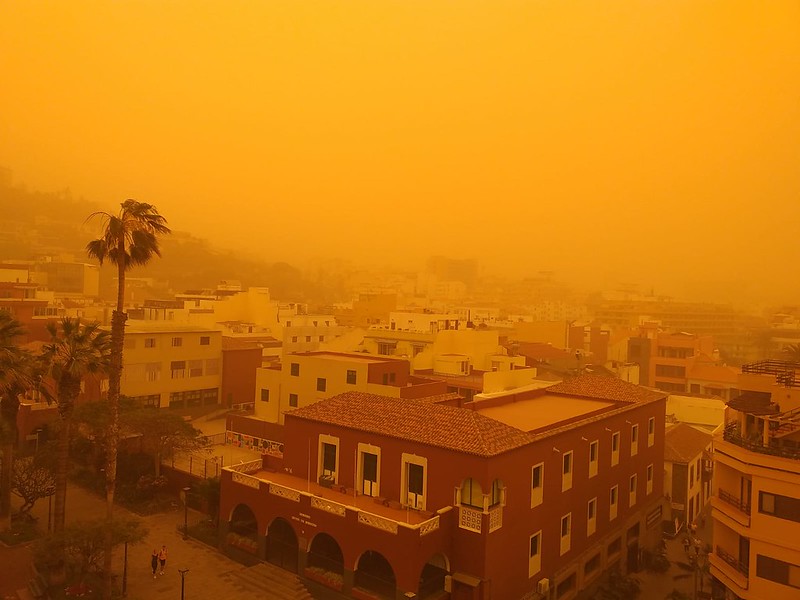
The weather here is truly appalling now, with very high winds and poor visibility due to the Calima sandstorm. See the pictures taken today, everything is a very weird orange colour caused by the sand in the air. This Puerto de la Cruz in the north of the island.
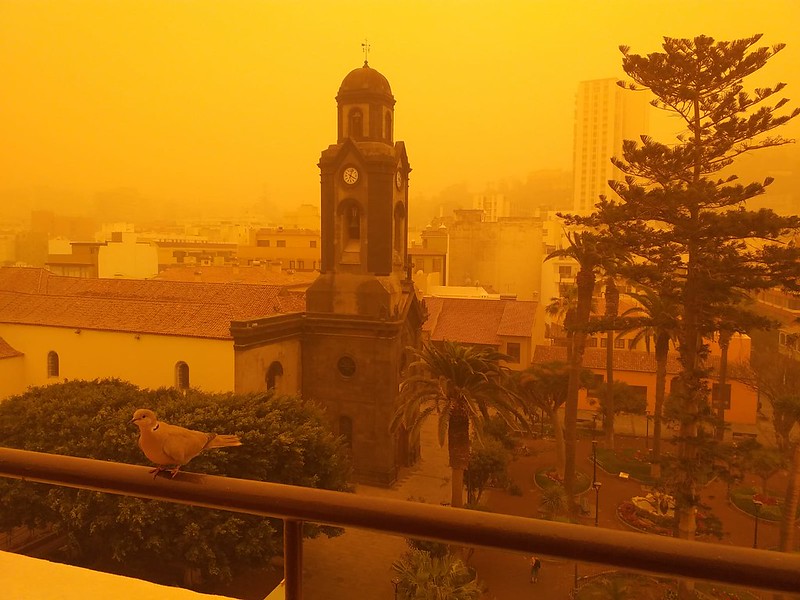
The advice is to check with your airline before heading to the airport if you are travelling to or from any of the Canary Islands today 23rd February 2020.

Buenavista del Norte Map
Buenavista del Norte is located on the north coast of Tenerife as shown on the map. The resort is approximately 66km by road from Tenerife south airport, 53km from the resorts of Playa de las Americas and Los Cristianos, 37km from Puerto de la Cruz, and 71km from the island’s capital city of Santa Cruz de Tenerife.
Booking.comPlaces to Stay in Buenavista
More info about Buenavista del Norte
How To Get From Tenerife South Airport To Los Cristianos Tenerife?
Santa Úrsula Photo Gallery
Santa Úrsula Weather
The warmest month in Santa Úrsula is August and the driest month is July, with the most sunshine during the months of July and August. The coolest months are December to April, with the most rain fall in December.
More info about Santa Úrsula
Santa Ursula 7 day Weather Forecast
Here is the weather forecast for the next 7 days in Santa Ursula in north Tenerife.


Santa Úrsula Map
Santa Úrsula is located on the northern side of Tenerife 10km from Puerto de la Cruz.
Booking.com
More info about Santa Ursula

